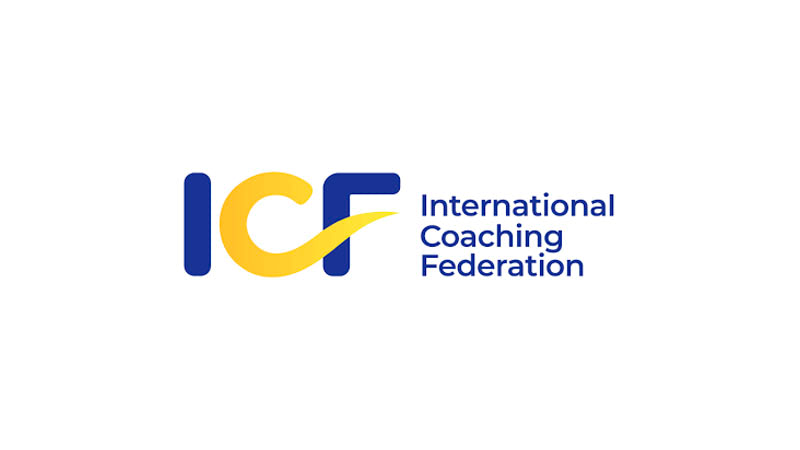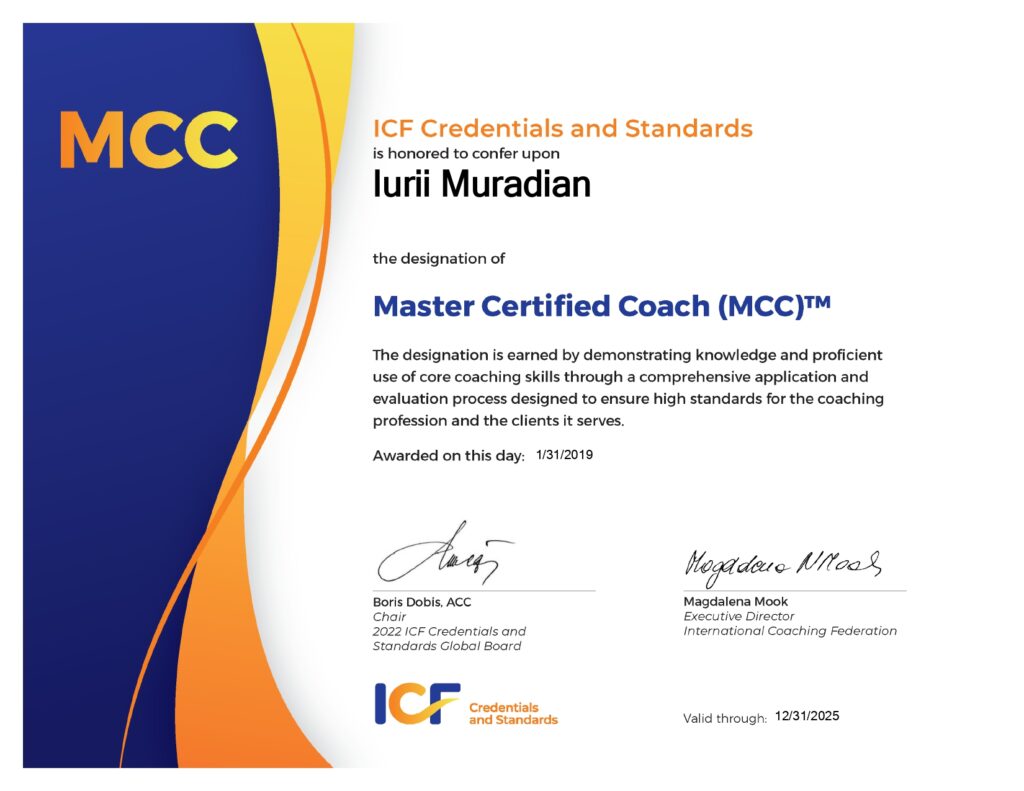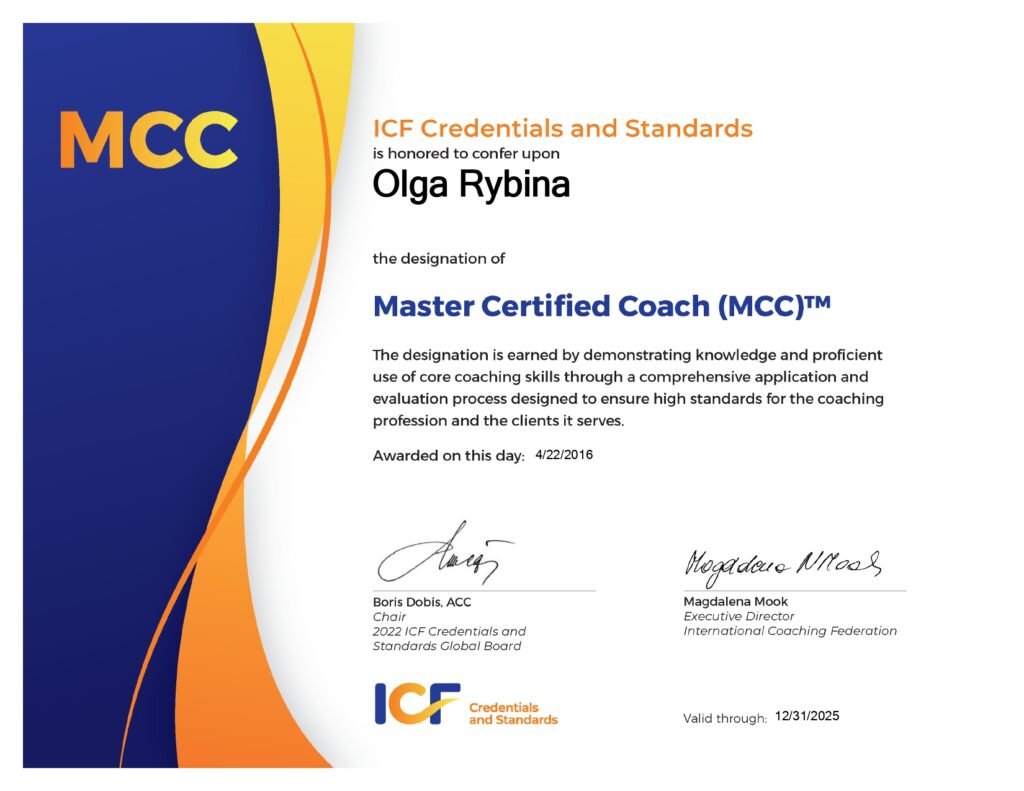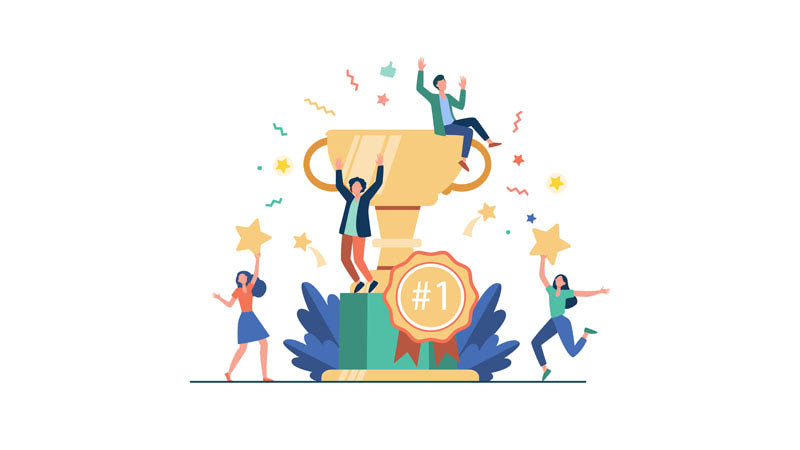Recently, the words «coach», «coaching» have been heard by almost everyone. Various business or life coaches offer their services on social networks and messengers, and advertising is full of tempting promotions… However, not everyone knows who coaches are: someone perceives them as charlatans or information gypsies, someone as mentors and instructors, someone considers coaching to be a subspecies of psychology, or even psychotherapy. In fact, this is a system of partner interaction between a client and a specialist. It is important to understand that a coach must have a wide range of practical skills that allow him to motivate the client, help them set goals and achieve them.
Thus, coaches are specialists who, of course, need to be professionally trained and certified. There are several international coaching communities. One of the most famous organizations is ICF. Let’s figure out what it is, what its job is, what ICF coaching is.

What is ICF
ICF (International Coaching Federation) is a professional association of personal and business coaches. Its goal is to form and maintain the reliability and quality of coaching in the global community. ICF is the world’s largest coaching association. It has more than 20,000 members in 50 countries around the world.
International Association of Coaches – principles, philosophy, goals
The main goal of the organization is support, which ensures the professional growth of coaches, allows them to rise to a higher professional level. It preserves the basic principles and integrity of the profession, trains new coaches.
Every year, the International Coaching Federation holds various conferences, meetings, and helps its members to establish communication. It creates an atmosphere of professional community, operates on the principles of maintaining the reliability and integrity of the profession. In addition, it develops various training programs, as well as programs for the accreditation of coaches, regulation of their work, and legal support.
The philosophy of the organization: coaching is an activity based on respect for the client’s experience. With this approach, each person is perceived as a holistic person, capable of creativity and having a large reserve of resources. This is the foundation on which the specialist relies in his work. The ICF Coach shall:
- accept the client as a person who is responsible for his actions, reliable and ready for action;
- discover the true goals and requests, clarify them for the client, help them adhere to them;
- identify strategies, ways and solutions that the client has developed;
- stimulate independent work, push the client to his own discoveries.
The main directions of ICF work:
- support for practitioners;
- development of professional standards;
- further development of coaching;
- accreditation of specialists is the world’s «gold standard» for coaches;
- conducting lectures, seminars, conferences, educational events for its members.
ICF Certification
ICF certificates are granted to those coaches who share the principles of high professionalism, ethics, and training. Such coaches have completed the ACSTH (Approved Coach Specific Training Hours) or ACTP (Accredited Coach Training Program) program and want to receive a certificate and status in the ICF.
Professional statuses of ICF certificates
To confirm the level of qualification, the presence of deep theoretical knowledge and skills, coaches can be certified and receive one of the following documents: Associate Certified Coach (ACC), Professional Certified Coach (PCC), Master Certified Coach (MCC). What are these certificates, what are their features?


Associate Certified Coach (АСС)
Associate Certified Coach. This certificate is a professional certified coach.
This is the very first stage of certification. ACC status demonstrates completion of basic training (at least 60 hours of coaching training) and relatively little coaching experience – 100 hours of coaching sessions. ACC level coaches demonstrate ICF competencies in 50% of their work.
If the coach does not move to the next level within three years after receiving the certificate, the document is cancelled.
Professional Certified Coach (PCC)
Professional Certified Coach. A next-level certificate for professional coaches.
This is the standard of a coach’s work. The holders of the PCC status show competence already in 70% of their work. They have more than 500 hours of coaching practice and at least 125 hours of coaching training. To achieve the “professional” level, coaches deepen their basic knowledge by studying the needs, internal conflicts, emotions and feelings of their client. This gives a holistic view of coaching, which means the depth of coaching sessions and the new status of the PCC.
Master Certified Coach (MCC)
Certified master coach.
MCC, masters, the «gold standard» is all about the highest stage of professional skill. At this level, the hours of the coach’s work exceed 2500 thousand, and the hours of the studied theory can no longer be counted. Master Certified Coach is a recognized coaching expert who shows his skills in more than 80% of his work. This is a constant way of working with yourself and your skills. Now in Russia, 17 people have passed this path and proudly bear the title of MCC. Among them are the heads of the Academy of Professional Coaching 5 Prism Yuri Muradyan and Olga Rybina.
Advantages of joining the International Coaching Federation
ICF is the largest organization of coaches, which has a high authority. Becoming a member of this community is a great honor for every specialist, it is a confirmation of the professional level. In addition, membership in the organization opens up endless prospects for career and personal growth, allows you to expand competencies, regularly update knowledge and gain new skills.
ICF pays great attention to the development of professional standards, modernizes, supplements and develops them, develops and selects relevant competencies of specialists. The Federation has developed clear criteria that determine the level of professionalism of the coach. They are recognized all over the world, and ICF certification indicates that you meet them.
One of the leading activities of the organization is the popularization of coaching in various fields. To this end, ICF cooperates with reliable, reputable media resources, holds various conferences.

Why should coaches become a member of the Federation?
- All members are included in the international database, so ICF coaches can work with clients from different countries. Such specialists do not need to undergo additional national certification.
- Members of the organization receive discounts: the cost of certification is reduced for them. In addition, coaches who pay annual membership fees get the opportunity to participate in international conferences, and to do so at a discount (its amount is equal to the amount of the annual fee).
- ICF coaches have broad prospects for improving their professional level. They get access to the Federation’s information resources, various training programs that can be completed online.
- Coaches can become members of various groups that bring together specialists from different countries. These are communities of interest that support their members, allow them to develop themselves and be realized in the professional or personal sphere.
- Another opportunity that members of the organization receive is participation in international coaching survey. This is not only an exciting, but also a useful process for professionals. Moreover, participants will learn about the survey results, which allows them to increase the level of their competencies.
How to join the ICF?
It is quite easy to become a member of this international community. Almost all practicing coaches who have received special training can do this.
- First of all, you need to fill out a special questionnaire on the official website of the Federation. This can be done online, the document does not need to be printed out, filled in manually.
- The next step is to pay the membership fee. You can pay for it through the Russian representative office of the Federation. Payment by bank card is also available – through an online banking system. This is the fastest and most reliable way.
- ICF members have a personal page on the official website of the Federation. It must be filled in by adding your photo (it can be downloaded from a computer, smartphone, tablet). In addition, coaches can download the organization’s logo. It can be placed on your own website or on a page in a social network, printed on a business card or booklet. For clients, this is an indicator of high professionalism, the status of a coach.
Key competencies of an ICF Coach
The International Coaching Federation has developed a structure of the Core competencies of coaches. It includes skills and abilities in eleven areas, and allows specialists to better understand the criteria by which they are evaluated. The structure of coaching competencies will also be useful to clients – with its help they will be able to correlate their expectations and the result of the impact with a specific coach or evaluate the effectiveness of the training.
The competencies included in this structure are required to obtain an ICF certificate. They are divided into main groups. It is important to understand that all these groups are equivalent in importance to each other, and are also interrelated. For effective, successful work with clients, the coach must be proficient in all the competencies.
List of the coach’s core competencies:
- Demonstrates Ethical Practice;
- Embodies a Coaching mindset;
- Establishes and maintains Agreements;
- Cultivates Trust and Safety for the client;
- Maintains presence;
- Listens actively;
- Evokes awareness;
- Facilitates client growth.
Demonstrates Ethical Practice
Any specialist should start from it in his work. To do this, he must know the standards of coaching and professional ethics, apply them in his work. Such a coach, when communicating with a client, takes into account his cultural and social environment, personal identity, his values and beliefs. He is a sensitive, attentive specialist who interacts with people based on the principles of decency and honesty. With the participants of the session, sponsors, he uses appropriate ways of communication, treats them respectfully. The coach must necessarily know the professional core values, comply with the Code of ethics. In his work, the specialist must respect confidentiality, not transfer the information received from the client to third parties, not disclose it.
A mandatory requirement is that the coach is aware of the difference between coaching, psychological or psychotherapeutic counseling, and other related or additional specialties. If the coach notices that the client has any deviations, mental problems, he is obliged to refer him to the appropriate specialists.
Embodies a Coaching mindset
Such specialists should have a specific mindset – flexible and open enough. The coach must be inquisitive, open to the client. At the same time, he must be aware of the boundaries of the spheres of responsibility: the specialist himself is responsible for the atmosphere of the meeting, solving organizational issues, building contact with the interlocutor. The client is directly responsible for the decisions made and their implementation (as well as for their own inaction).
Coaching is a profession that you can learn all your life, so successful specialists do not stop in their development, constantly discovering new facets of such a specialty. One of the important areas is reflexive practice, which should be continuous. It allows the specialist to make sessions more effective, find mutual understanding faster, establish contact with the client.
Experienced, successful coaches, as a rule, have a well-developed intuition, a high level of awareness. Specialists use these qualities only for the benefit of clients. At the same time, they understand that the cultural environment and context affect both the interlocutors and themselves, and they are open to these processes.
Preparing for a session is not only planning a meeting, selecting effective coaching tools for a particular person (or group of people), but also creating a certain psychological mood. To do this, the coach constantly improves the ability to control his emotions. If he understands that knowledge, competencies and practical skills are not enough to help the client, he openly admits this, and asks for support and help using external resources.
Establishes and Maintains Agreements
Coaching sessions are partnerships that are built on the basis of agreements. They are developed by a specialist, making sure that the terms of the agreements are clear to all participants. It is worth noting: various types of such arrangements are practiced in coaching. They can be valid for one session or the entire time of partner work with the client.
To create them, a specialist tells what coaching is, explains the difference between such an interaction and, for example, a psychologist’s session. Before starting work, the coach must describe the process, clearly state the rules of partnership, tell about the responsibility of the parties and their mutual interest in working and achieving a certain result.
During communication with the client, it is necessary to develop a certain framework: what is appropriate in sessions, and what is better to refuse. Before starting work, it is worth discussing and coming to an agreement on issues of payment, duration of cooperation, confidentiality, logistics, meeting schedules, terms of termination of communication, as well as the involvement of third parties in the process.
When drawing up a plan and defining coaching goals, the specialist coordinates them with the client. It is also important to determine the compatibility of partners. It is the coach who helps the client to control the focus of attention on sessions, keeps track of time.
Partnership with a client is a necessary competence of a coach, which plays a role at different stages of interaction:
- when defining the client’s short-term goals (for example, for the current session);
- when defining the topic of the meeting;
- when developing criteria for measuring client success;
- at the end of the relationship.
As a rule, the initiator of the completion of the partnership is the client himself – choosing another direction or achieving the desired result.
Cultivates Trust and Safety for the client
The relationship between the coach and the client is based on the principles of mutual trust and respect. At the same time, it is the specialist who creates an atmosphere at the sessions that allows the interlocutor to feel safe, get rid of fear, and fully open up.
He respects the identity of the interlocutor, openly showing it, and also adapts the style of communication to a specific person. At the same time, the coach takes into account the context of the partner, which facilitates the achievement of mutual understanding. During communication, he notes, focuses the interlocutor’s attention on his strengths, talents. It is very important for a coach to have the skills of empathy, to show it towards the client, to show him care and support, especially if a person openly expresses his fears, ideas, fears, feelings, point of view. The coaching session should be based on the principles of transparency.
Maintains presence
This competence allows the specialist to maintain a state of full awareness during meetings. To achieve such a result, he communicates with the client confidently, argumentatively, openly, shows flexibility.
During the session, the coach retains focus and empathy, shows observation and curiosity. If the client experiences strong emotions, is afraid to work with them, the specialist must show confidence in his abilities and convey this belief to the interlocutor. At the same time, the coach must control his own emotional background, maintain presence. Sometimes it is necessary to pause during sessions, stay in silence – the specialist should give the partner such an opportunity.
Working in the zone of uncertainty should not frighten or cause discomfort to the coach.
Listens actively
During the session, the specialist focuses entirely on communicating with the client. He must understand what the interlocutor says and how, and also realize what he is hesitant, shy or unwilling to talk about. In this way, the coach provides support, establishes mutual understanding and promotes self-expression of the person with whom he cooperates.
During the sessions, the specialist can summarize the thoughts, phrases, and individual feelings that the client is talking about. This allows the parties to deepen understanding, provides clarity of the conversation. The coach must take into account the context in order to better understand what the interlocutor is talking about. If the specialist notices the omissions, he does not close his eyes to them, but delves into the questions to help the partner open up.
An important stage of coaching is research, during which the coach works with emotions, behavioral characteristics, nonverbal signals of the client, noting their change. Such work allows you to better understand the meaning of the interlocutor’s messages, take into account not only verbal statements, but also compare them with other factors.
The coach helps clients identify patterns and dominant themes. To achieve such a result, he tracks the main trends in changes in the emotional background, behavioral reactions.
Evokes Awareness
During coaching sessions, many clients achieve a state of insight. This is facilitated by correctly selected tools. The coach chooses effective techniques for a particular person. It can be analogies or strong questions, metaphors or silence. They also allow you to teach the client new skills.
This competence includes the ability to challenge, as one of the ways to awaken awareness; take into account the previous experience of the interlocutor, choosing the most effective and useful techniques. To pick them up, the specialist asks the client questions about him: about the basic life values, way of thinking, needs. Only by understanding the partner’s desires, the coach can help, choose the appropriate tools and techniques, adapt the approach to the needs and needs of a particular person. At the same time, he should be able to notice the factors that contribute to progress, unobtrusively provide information about the results of his own observations of the partner.
During the sessions, the coach asks questions that take the client beyond the usual way of thinking, encourages him to share the experience that the interlocutor has at the moment, supports the partner’s desire in the process of reframing analysis and changing views on life in general and on a specific situation.
The specialist’s task is to help the interlocutor identify factors that affect his emotions, behavioral habits and patterns, mindset. It is very important for the client to start creating ideas about ways to achieve the goal, to realize what he can do. The coach’s support is needed here.
Facilitates client growth
During coaching sessions, the specialist helps the client to turn insights and existing knowledge into concrete steps and actions, while maintaining the autonomy of the interlocutor.
One of the important tasks of the coach is to work together with the client to introduce new conclusions, deductions, ideas into the usual, everyday behavior or perception of the surrounding reality. Such partnerships include setting relevant, meaningful goals, as well as developing a further action plan. It is very important that at this stage the client defines the key parameters of responsibility.
A successful specialist supports the client’s autonomy when he makes plans or prioritizes goals. He also provides support at the stage of analyzing the results of actions, forming conclusions. During the sessions, the coach focuses on the partner’s successes, helps him focus on the progress made, but encourages him not to stop, but to think over further options for movement, taking into account possible problems and available resources.
How to renew an ICF certificate
If the coach has received an ACC or PCC certificate, it must be renewed at least once every three years. To do this, you can submit documents online (you need to do this on the Federation’s website by selecting the appropriate level of accreditation). The certificate can be renewed only if the specialist has confirmed his practice and training with the relevant documents. Renewal is a paid service.
In order to renew the ICF coaching certificate, it is necessary to complete at least forty hours of training in programs that are indicated by CCE (Continuing Coach Education). These are additional educational courses. They are taken by coaches between certifications. Please note: the number of hours is taken into account only since the previous certification. Thus, within three years, the coach needs to complete several additional programs.
Mandatory requirement: out of forty training hours, 24 are the core competencies of the coach, their detailed study. Another 3 is the study of the ethics of the profession.
In order to renew the ACC level certificate, the coach must additionally undergo a mentor session (at least ten hours) – this will allow the specialist to continue professional growth.




